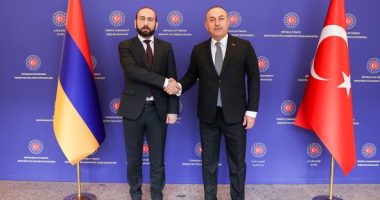BAKU — Azerbaijani President Ilham Aliyev has stripped a prominent novelist of the title of “People’s Writer,” as well as his presidentially awarded pension.
Azerbaijani media reported on February 7 that the actions were taken against Akram Aylisli because of his novel “Stone Dreams,” which was printed in a popular Russian magazine last year.
The novel is set during the wake of a bitter war between Azerbaijan and Armenia over Nagorno-Karabakh, which drew protests after its publication for its sympathetic depiction of Armenians.
Azerbaijani media quoted Aliyev’s decree, which said Aylisli was punished “for distorting facts in Azerbaijani history and insulting the feelings of Azerbaijani people.”
Angry crowds gathering this week outside a Baku apartment block shouting “Shame!” and setting photos of Akram Aylisli alight. The protesters’ complaints were hardly aesthetic. Few, in fact, appeared to have read the book.
In the novel Aylisli refers to mob violence by Azerbaijanis against helpless Armenians in Baku.
One passage vividly describes the scene of a mob beating up a man they thought was Armenian and another episode suggests that an Azerbaijani man threw an elderly Armenian woman from a balcony.
Aylisli described the novel as a message of peace and said that he didn’t expect such a heated response.
“I wanted to show that Azerbaijanis and Armenians aren’t enemies,” he told The Associated Press. “I never thought it would be so politicized.”
He said that he hoped that an author in Armenia would consider writing similar material dwelling on atrocities against Azerbaijanis.
Azerbaijan’s Orhan Pamuk
While Aylisli has voiced such sentiments informally in the past, “Stone Dreams” marks the first time the author has expressed his political views in his fiction writing.
A former lawmaker, Aylisli has also been a staunch critic of the ruling regime. “Stone Dreams” makes thinly veiled, and deeply negative, references to Heydar Aliyev, the former president and father of the current leader, Ilham Aliyev.
Ali Akhmedov, the executive secretary of the ruling Yeni Azerbaycan Party, said Aylisli had dealt a “moral blow” to the country and even accused the writer of secretly being Armenian.
Azerbaijani lawmakers meeting on February 1 in parliament went so far as to call for a DNA test to determine Aylisli’s ethnic heritage. Others called for him to be stripped of his status as a state writer and even his citizenship.
Other critics have compared Aylisli to the Turkish writer Orhan Pamuk, the internationally celebrated author who has come under fire at home for comments related to the Ottoman-era massacre of ethnic Armenians, a taboo subject in Turkey.
Mubariz Gurbanli, a ruling party lawmaker, this week queried Aylisli’s motivations in writing “Stone Dreams.”
“Perhaps he wants to win a Nobel Prize as Orhan Pamuk?” he said. “He wants to please somebody by distorting the history of his people?”
Aylisli told RFE/RL he dismissed such criticism and accused Azerbaijani officials of exploiting the Azerbaijani-Armenian impasse for their own political gain.
“There are people who have made a fortune out of the sufferings of two people — Azerbaijanis and Armenians,” he said. “They’ve built careers, gotten rich, gotten good jobs [in the government]. I knew that those people would react angrily to my novel. Because they see this novel as something that speaks against them. They would never say that they were wrong in inflaming this war and causing the suffering of these people. They don’t want this conflict to be solved. They want to continue their luxurious lives, live in their villas, and let common people continue to suffer.”
Aylisli, 75, graduated from the prestigious Gorky Literature Institute in Moscow. He won appreciation for his focus on rural and provincial life, basing his pen name — Aylisli — on the name of his native village in Azerbaijan’s Ordubad region.
His most famous works include the 1963 “When the Mist Rolls Over the Mountains,” and “What the Cherry Blossom Said,” published in 1983.
He has won numerous awards during both the Soviet and post-Soviet periods, including the Lenin Komsomol Award in 1968 and the Independence Award in 2002, the highest order in post-Soviet Azerbaijan.









